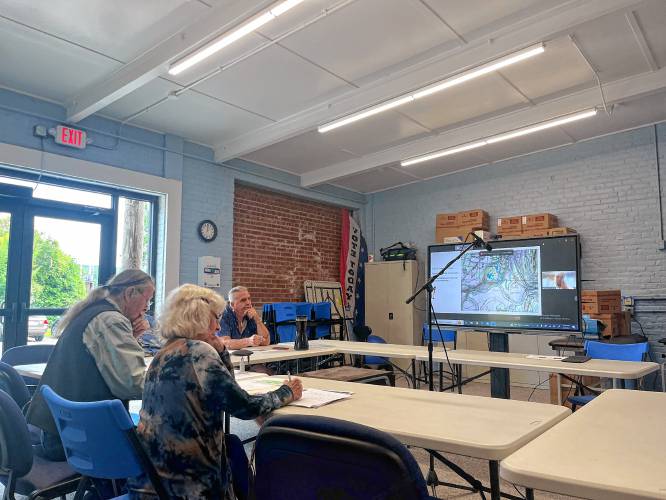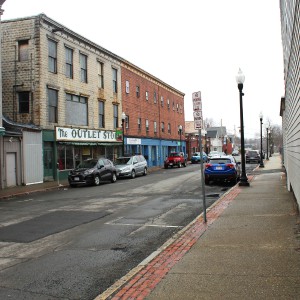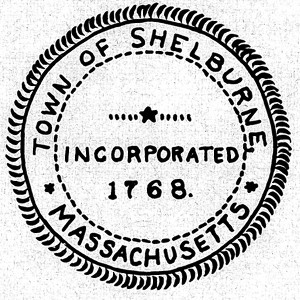Beacon Hill Roll Call: March 17 to March 21, 2025

Members of the Montague Battlefield Study Advisory Board participate in a hybrid meeting in August 2024. The House and Senate approved and sent to Gov. Maura Healey legislation that would extend, until June 2027, the current law that allows municipalities to offer remote participation at public meetings. STAFF FILE PHOTO/ERIN-LEIGH HOFFMAN
| Published: 03-28-2025 12:41 PM |
Beacon Hill Roll Call records local representatives’ votes on roll calls from recent debate on the House rules. There were no roll calls in the House or Senate last week.
The House, 23-128, rejected a House rules amendment that would require bills be made available to House members and the public no later than noon two days prior to consideration. The proposal would also set an amendment deadline of 5 p.m. the day after the bill is released, or one day prior to consideration. For example, a bill released on a Monday by noon would have an amendment deadline of 5 p.m. on Tuesday, and the House would debate and vote on the amendments and the bill on Wednesday.
“Under current House rules, there is a same-day amendment filing deadline of 5 p.m. for bills that are released by noon,” said amendment sponsor Rep. Brad Jones, R-North Reading. “This gives members very little time to review legislation, draft amendments and file those amendments. The House and joint rules offer a perfect example of why this rule should be changed, as members essentially had about five hours to review more than 200 pages of documents, try to understand what was and wasn’t in either rules proposal, and then draft amendments before the 5 p.m. filing deadline. The current process simply doesn’t provide enough time for members to review legislation and offer amendments.”
Rep. Jessica Giannino, D-Revere, said extending the bill distribution timeline to two days can and will slow down the entire legislative process. She argued that this introduces unnecessary delays, especially in situations that demand swift action, such as emergencies or rapidly developing circumstances in need of legislative action. She noted that the current one-day rule strikes a better balance between maintaining transparency and allowing efficiency, and noted the House must ensure legislative operations remain agile.
A “No” vote is against the amendment requiring that members have two days to read legislation before voting on it.
Rep. Natalie Blais — No
Rep. Aaron Saunders — No
Rep. Susannah Whipps — No
Article continues after...
Yesterday's Most Read Articles
 Four Red Fire Farm workers arrested as part of ICE operation in Springfield
Four Red Fire Farm workers arrested as part of ICE operation in Springfield
 Avery’s General Store building in Charlemont for sale
Avery’s General Store building in Charlemont for sale
 Greenfield seeks renewal of Slum and Blight designation to bring in funds for infrastructure
Greenfield seeks renewal of Slum and Blight designation to bring in funds for infrastructure
 Amherst’s Ryan Leonard signs entry-level contract with Capitals, expected to make NHL debut Tuesday in Boston against the Bruins
Amherst’s Ryan Leonard signs entry-level contract with Capitals, expected to make NHL debut Tuesday in Boston against the Bruins
 Greenfield Fire Station’s energy use 250% higher than expected
Greenfield Fire Station’s energy use 250% higher than expected
 The ills of a billion-dollar enterprise: The slow-death of the cannabis industry, and what might be done to reverse the trend
The ills of a billion-dollar enterprise: The slow-death of the cannabis industry, and what might be done to reverse the trend
The House, 23-128, rejected a House rules amendment that would require House committee polls to be open for at least two hours or until all committee members have voted. Committee polls are used to record which members favor or oppose a bill that was heard by the committee.
“When voting to advance legislation, it is important that the members understand the bill they’re voting on so they can make an informed decision,” said amendment sponsor Rep. Brad Jones, R-North Reading. “That is not always possible with the short turnaround time required of some polls, especially when the bills under consideration have been redrafted, are lengthy or are technical in nature. Providing a two-hour window to respond to a poll is a reasonable compromise that will help to ensure that each member feels comfortable with their vote without hampering the committee’s ability to move legislation in a timely fashion.”
Amendment opponents offered no arguments. But earlier that day, the House voted against a similar amendment to the joint House-Senate rules. At that time, Rep. Kathy LaNatra, D-Kingston, said, “In Massachusetts, we have a full-time, professional Legislature, which requires preparation and preparedness. When a poll is released by a committee chair, that should not be the first time we are reading a piece of legislation. Committee polls should remain at the chair’s discretion, ensuring decisions reflect urgency rather than arbitrary deadlines. Committees I have been on have provided days to review language. We must, however, always maintain our ability to act for our constituents when the time arises.”
Rep. Mike Moran, D-Brighton, a member of the House Rules Committee who helped write the House rules package, did not respond to repeated requests by Beacon Hill Roll Call to explain why he and the Democrat House leadership voted against the amendment.
A “No” vote is against the two-hour minimum.
Rep. Natalie Blais — No
Rep. Aaron Saunders — No
Rep. Susannah Whipps — No
The House, 23-128, rejected a House rules amendment that would require all House committee members to be notified at least 12 hours in advance if the committee is going to poll members electronically.
“When a poll is released with a tight deadline to respond, there is always a danger that a committee member may not see it until after the poll has closed because they may be tied up in a constituent meeting, attending a municipal event in their district, or driving to the State House and unable to review their emails,” said amendment sponsor Rep. Brad Jones, R-North Reading. “This amendment simply provides members with advance notice of an upcoming poll so they can plan their schedule accordingly and provide a timely response.”
Amendment opponents offered no arguments. But earlier that day, the House voted against a similar amendment to the joint House-Senate rules. At that time, Rep. Christine Barber, D-Somerville, said, “As full-time legislators, committee work and committee votes are a major part of our role. Requiring a 12-hour notice for an electronic poll would not increase the efficiency of our legislative process and [would] only slow down our work to address critical issues.”
Rep. Mike Moran, D-Brighton, a member of the House Rules Committee who helped write the rules package, did not respond to repeated requests by Beacon Hill Roll Call to explain why he and the Democrat House leadership voted against the amendment.
A “No” vote is against the 12-hour minimum.
Rep. Natalie Blais — No
Rep. Aaron Saunders — No
Rep. Susannah Whipps — No
The House and Senate approved and sent to Gov. Maura Healey legislation that would extend, until June 2027, the current law that allows municipalities to offer remote participation at public meetings. The option, first adopted during the COVID-19 pandemic and subsequent state of emergency, was due to expire on March 31. The extension applies to public bodies and representative town meetings.
“I voted for this legislation because it has substantially increased resident participation and engagement in local government and has made it easier for public bodies to manage their meetings with both equity and transparency,” said Sen, Mike Rodrigues, D-Westport, chair of the Senate Committee on Ways and Means. “It’s been clear from municipalities across the commonwealth that they want to continue to offer this expanded access.”
“I have heard loud and clear from my colleagues, and the communities we represent, that hybrid meetings have increased access, engagement and transparency in local government,” said Senate President Karen Spilka, D-Ashland. “There is no reason that a family obligation, a car breakdown, a disability or any other life circumstance should get in the way of making your voice heard on an issue you care about in your community.”
“One of the lessons we learned from the pandemic was that using technology for public meetings expands access and civic participation across government,” said House Speaker Ron Mariano, D-Quincy. “With this extension, we are removing barriers to participation and residents will continue to be able to be active participants in governmental decisions remotely.”
Gov. Maura Healey and the Massachusetts Cultural Council announced that the state is now accepting applications to fill the new role of poet laureate of Massachusetts.
Healey created the new position in February when she signed an executive order establishing the position. This honorary position is designed to promote poetry and creative expression, serve as the governor’s ambassador of the arts and inspire the next generation of writers. The poet laureate will be eligible for an honorarium from the Massachusetts Cultural Council.
The poet laureate will be charged with encouraging the appreciation of poetry and creative expression across Massachusetts, participating in public readings and other statewide literary and cultural events, composing poetry for ceremonial occasions, and advising the Department of Elementary and Secondary Education on an outreach program for schools that will focus on the celebration and advancement of poetry.
“I was proud to sign an executive order establishing our first-ever state poet laureate,” Healey said. “We’re excited to be opening the application so that local poets from across the state can apply for this historic position. This is an opportunity to spread the gift of poetry, celebrate the talent in our state, stoke the fires of imagination and tell our stories.”
“The Mass Cultural Council, the commonwealth’s state arts agency, believes in the Power of Culture and recognizes poetry as a strong and vital art form that inspires connection, fosters empathy and gives voice to diverse experiences,” said Massachusetts Cultural Council Executive Director Michael Bobbitt. “Poetry has the unique ability to capture the essence of human emotion, challenge perspective and build bridges between communities. This new voice will help to enrich our cultural landscape, remind us of our rich legacy of profound writers and strengthen the creative spirit of the commonwealth.”
To apply for the position or for more information, go to massculturalcouncil.org/artists-art/poet-laureate/application-process. The deadline is April 10.
Rebecca Tepper, secretary of the Executive Office of Energy and Environmental Affairs, announced $5.7 million in funding for farmland preservation. The funding is aimed at protecting 400 acres of farmland through the state’s Agricultural Preservation Restriction (APR) Program. Another $500,000 will be distributed to help existing Massachusetts APR farmers restore land that was previously unsuitable for farming.
“Massachusetts farmers are some of the strongest and most resilient people I’ve met,” Tepper said. “Between extreme weather, high costs and now a tariff war, our farmers deserve our support more than ever. Our programs are designed to keep existing farms strong and revive unused land for farming. This means better food security and a healthier environment for everyone in Massachusetts.”
Whitney Demetrius joined the Executive Office of Housing and Livable Communities as the state’s first director of fair housing. The position was established by the Healey-Driscoll administration’s Affordable Homes Act to support fair housing initiatives, including enforcement, testing, outreach and education, as well as collaborating with state agencies to advance fair housing policies and programs.
“A crucial part of ensuring our commonwealth is truly livable is addressing the barriers to fair housing and housing choice,” Demetrius said. “I am eager to work collaboratively in this role to carry out the vision of this administration, putting fair housing at the forefront of our path forward.”






 Stage on Main exhibit displays Athol resident’s work through the decades
Stage on Main exhibit displays Athol resident’s work through the decades Shelburne voters asked to consider opioid fund transfers, CPA uses
Shelburne voters asked to consider opioid fund transfers, CPA uses PHOTOS: Career conversations
PHOTOS: Career conversations
